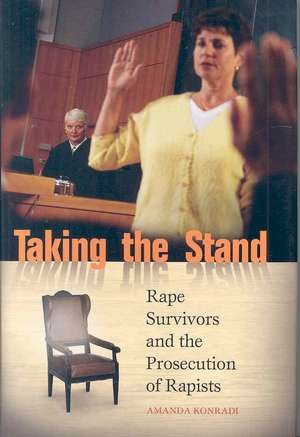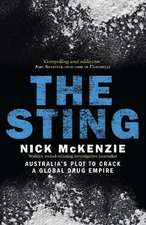Taking the Stand: Rape Survivors and the Prosecution of Rapists
Autor Amanda Konradien Limba Engleză Hardback – 29 oct 2007 – vârsta până la 17 ani
Preț: 356.01 lei
Preț vechi: 481.73 lei
-26% Nou
Puncte Express: 534
Preț estimativ în valută:
68.12€ • 71.13$ • 56.25£
68.12€ • 71.13$ • 56.25£
Carte tipărită la comandă
Livrare economică 15-29 aprilie
Preluare comenzi: 021 569.72.76
Specificații
ISBN-13: 9780275997182
ISBN-10: 0275997189
Pagini: 240
Dimensiuni: 156 x 235 x 24 mm
Greutate: 0.52 kg
Editura: Bloomsbury Publishing
Colecția Praeger
Locul publicării:New York, United States
ISBN-10: 0275997189
Pagini: 240
Dimensiuni: 156 x 235 x 24 mm
Greutate: 0.52 kg
Editura: Bloomsbury Publishing
Colecția Praeger
Locul publicării:New York, United States
Notă biografică
Amanda Konradi is currently a visiting associate professor at Loyola College of Maryland. She has served on the editorial boards of Gender & Society and Teaching Sociology and reviews proposals for the Woodrow Wilson Foundation Women's Studies Dissertation Fellowship program. She has published three editions of Reading Between the Lines and professional articles in Gender & Society, Violence Against Women, Law & Social Inquiry, and American Journal of College Health. She has received awards for her teaching at the University of California - Santa Cruz and Ohio University.
Recenzii
This unique book attempts to do several things at once: present research data with regard to rape survivors' satisfaction and problems with the prosecution of their rapes; honor the survivors' stories, giving air to certain experiences that have not been written about; create a guidebook for those who may go forward into the world of police, lawyers, judges, and juries; and offer suggestions regarding education, the criminal justice system, and rape experts..Every lawyer who works with rape victims should have a copy in his or her office. Rape survivors certainly need a guidebook for this complicated and difficult process..[t]herapists can use sections of the book to help guide their clients through the process as they go forward in their prosecution. This book will provide valuable insights for those interested in the analysis of discourse on rape and the cultural stereotypes of the rape victim.
This new work informs and enriches our understandings of this topic (and symbolic interaction) on many different levels. . . . a richly detailed and wide-ranging description of processes of rape prosecution and their meanings from the perspective of survivors. . . None have so completely and carefully documented the myriad activities of such 'goal-directed problem solvers' as has Konradi, or done so with such clear-eyed compassion. This is another way in which her work can be a model for those of us and for our students who are doing research and writing about the horrible or simply humiliating things to which victims, victim-witnesses, survivors, and others who lack power, or who are overpowered, are subject.
Amanda Konradi's work Taking the Stand: Rape Survivors and the Prosecution of Rapistsis significant in that it provides readers with real-life accounts of victims of rape, detailing their entire experience from the rape and the dilemma of whether to report through their interactions with the criminal justice system. . . . This book should help to inspire women who have yet to come forward to report rape, by illustrating that even the most horrifying experience can be a source of strength. . . . Konradi's work can help prosecutors, victim advocates, and most importantly rape survivors to understand the legal process that will follow the report of a rape. This book's firsthand accounts from women throughout their journey through the legal system can help other victims by giving them knowledge of what is to come. The firsthand accounts alsomake Konradi's research much more compelling. These are not numbers or percentages; they are the real words and experiences of victims.
This new work informs and enriches our understandings of this topic (and symbolic interaction) on many different levels. . . . a richly detailed and wide-ranging description of processes of rape prosecution and their meanings from the perspective of survivors. . . None have so completely and carefully documented the myriad activities of such 'goal-directed problem solvers' as has Konradi, or done so with such clear-eyed compassion. This is another way in which her work can be a model for those of us and for our students who are doing research and writing about the horrible or simply humiliating things to which victims, victim-witnesses, survivors, and others who lack power, or who are overpowered, are subject.
Amanda Konradi's work Taking the Stand: Rape Survivors and the Prosecution of Rapistsis significant in that it provides readers with real-life accounts of victims of rape, detailing their entire experience from the rape and the dilemma of whether to report through their interactions with the criminal justice system. . . . This book should help to inspire women who have yet to come forward to report rape, by illustrating that even the most horrifying experience can be a source of strength. . . . Konradi's work can help prosecutors, victim advocates, and most importantly rape survivors to understand the legal process that will follow the report of a rape. This book's firsthand accounts from women throughout their journey through the legal system can help other victims by giving them knowledge of what is to come. The firsthand accounts alsomake Konradi's research much more compelling. These are not numbers or percentages; they are the real words and experiences of victims.










